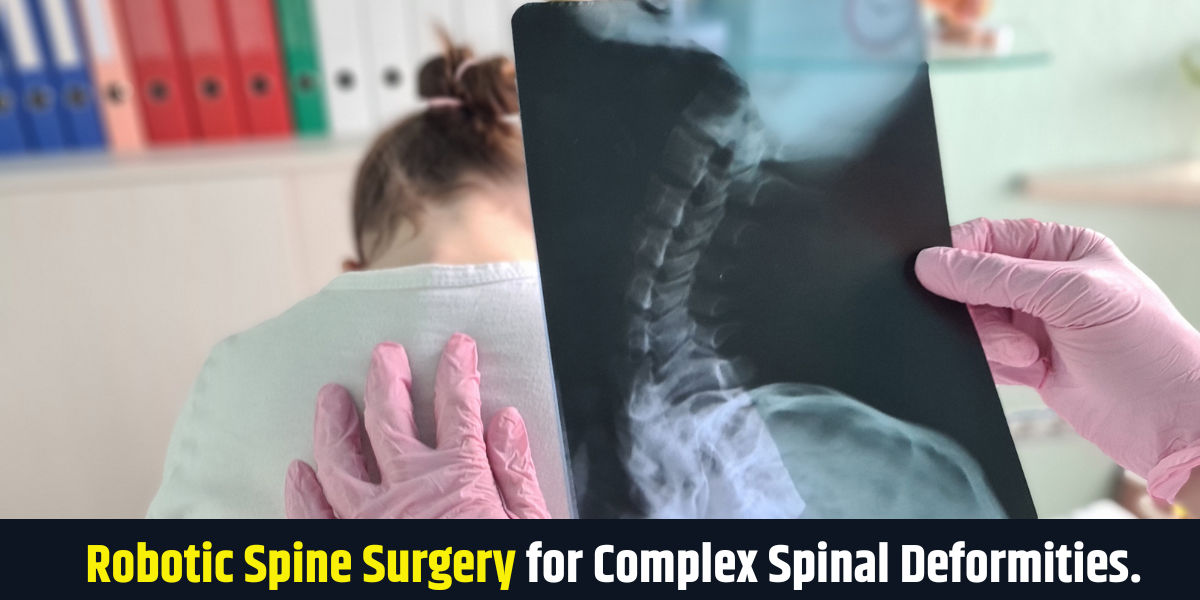Robotic Spine Surgery for Complex Spinal Deformities.
Robotic spine surgery is changing the way we treat complex spinal deformities like scoliosis and kyphosis. This advanced technique allows surgeons to perform surgery with greater precision and less invasiveness than traditional methods. By using robotic systems, doctors can correct spinal issues more accurately, leading to better outcomes and quicker recovery for patients. In this article, we’ll explore how robotic spine surgery works, its benefits, and what patients can expect from this innovative treatment. Robotic spine surgery for all spinal issues is provided by Dr. Shrikant Dalal at the Orthos Centre, a spine clinic in Pune. This advanced technique helps doctors perform spinal surgeries more accurately, especially for complicated spine problems.
What is robotic spine surgery?
Robotic spine surgery is a minimally invasive technique that utilizes robotic systems to assist surgeons during spinal operations. It enhances accuracy, reduces tissue damage, and often results in quicker recovery times compared to traditional open surgery.
What are complex spinal deformities?
Complex spinal deformities include conditions such as scoliosis, kyphosis, and other structural abnormalities of the spine that may require surgical intervention. These deformities can lead to pain, functional limitations, and psychological issues.
How does robotic spine surgery work?
During robotic spine surgery, the surgeon uses a robotic system equipped with advanced imaging technology. This allows for real-time visualization of the spine, enabling precise placement of screws and rods. Dr. Shrikant Dalal at the Orthos Centre controls the robotic arms, ensuring accuracy and reducing the risk of complications.
What are the benefits of robotic spine surgery?
The benefits of robotic spine surgery include:
Enhanced Precision: The robotic system allows for better alignment and placement of hardware.
Reduced Blood Loss: Minimally invasive techniques generally result in less bleeding during surgery.
Shorter Recovery Time: Patients often experience quicker recoveries and less postoperative pain.
Smaller Incisions: This leads to less scarring and a reduced risk of infection.
What are the risks associated with robotic spine surgery?
As with any surgical procedure, robotic spine surgery carries some risks, including:
Infection
Nerve damage
Blood clots
Complications from anesthesia However, the risks are typically lower compared to traditional open surgery due to the minimally invasive nature of the procedure.
Who is a candidate for robotic spine surgery?
Candidates for robotic spine surgery typically include individuals with:
Severe spinal deformities that affect quality of life
Previous unsuccessful surgeries
Conditions requiring complex corrections A thorough evaluation by Dr. Shrikant Dalal at the spine clinic in Pune is essential to determining suitability.
What is the recovery process like?
Recovery from robotic spine surgery can vary by individual, but many patients are able to return home within a day or two. Physical therapy often begins shortly after surgery to promote healing and regain strength. Most patients can return to normal activities within weeks, although complete recovery may take several months.
How does robotic spine surgery compare to traditional methods?
Robotic spine surgery typically offers several advantages over traditional methods, including:
Increased Accuracy: The robotic system’s precision helps in minimizing errors.
Reduced Hospital Stay: Patients often experience shorter hospital stays.
Less Pain: The minimally invasive approach generally results in less postoperative pain.
What advancements are expected in robotic spine surgery?
As technology advances, robotic spine surgery is expected to become even more sophisticated. Innovations may include improved imaging techniques, enhanced robotic capabilities, and AI-assisted surgical planning, all aiming to further improve outcomes for patients with complex spinal deformities at the Orthos Centre.
Robotic spine surgery represents a significant advancement in treating complex spinal deformities, offering patients a minimally invasive option with promising outcomes. If you or a loved one is dealing with a spinal deformity, consulting Dr. Shrikant Dalal at the Orthos Centre, a premier spine clinic in Pune, could be a vital step towards better health.


